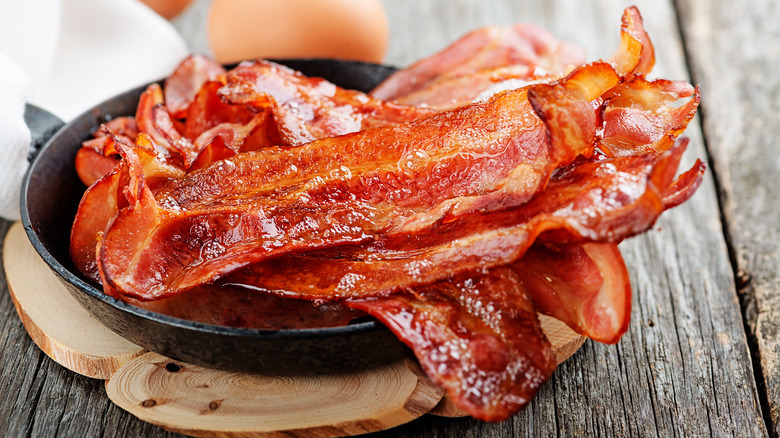The Real Reason You're Craving Bacon
Has your mouth ever watered upon hearing someone talk about bacon, leaving you tempted to run to your fridge and cook some for yourself? Like many people, maybe bacon is among one of your favorite breakfast foods. As per Statista, approximately 268.04 million Americans reported eating bacon in the year 2020 alone.
According to a National Today survey conducted in honor of National Bacon Day, 21% of Americans love bacon so much that they would eat it every day, and 16% admitted they couldn't live without it (per CBS News). It might surprise you that bacon even made a special appearance in the first-ever meal on the moon (via Popular Science).
If you love bacon as well, it's completely understandable, given its crispy texture and salty flavor. However, those who truly wish to eat bacon every day might want to think twice before entertaining that idea. As explained by MedicineNet, because bacon is processed meat, it can be linked to many health problems and fatal diseases. Bacon contains nitrates and nitrites, two preservatives that are associated with forming cancers, such as stomach and colon cancer. Bacon is also high in salt, which can increase blood pressure and contribute to heart disease or stroke.
Although we know bacon isn't the healthiest option out there, it's not easy to fight our cravings for it. Why is it that our mouths still water for bacon, even though we know there are foods that are better for us?
Why we crave bacon
It turns out that there might be a scientific reason why bacon tempts us so much. According to BBC, scientists discovered that humans have a taste receptor for the savory umami flavor that's found in bacon. Also known as "the fifth taste," umami joined the taste family alongside sweet, salty, bitter, and sour in 1990, as illustrated by Cast Iron Cooking. Bacon actually contains six different umami flavors, which can contribute to bacon becoming addictive, due to umami triggering a neurochemical response in the brain that leaves you craving more (per Tastemade). Additionally reported by Cast Iron Cooking, the aroma of bacon can further contribute to our cravings. What we perceive as the taste and flavor of the meat is mostly the aroma of bacon sending signals to our brain, explained food developer Barb Stuckey.
According to the Harvard T.H. Chan School of Public Health, environmental factors can also contribute to the severity of food cravings. By simply watching an advertisement or seeing photos of a particular food on social media, you could experience cravings for that particular food. In addition, chronic stress can play a part in food cravings for high-fat foods, due to the brain releasing cortisol. Eating foods like bacon that are high in fat, sodium, and calories can stimulate brain-reward pathways responsible for the cravings that you feel, and these neurochemical changes can promote cravings or over-eating (per CNN).


